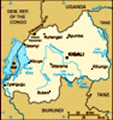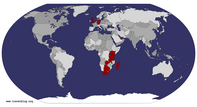Advertisement
Published: October 12th 2007
After the Gorilla tracking in Parc National Des Volcans, we decided to head to one of the small towns on Lake Kivu in Western Rwanda called Gisenyi with Brian and Anne. Unfortunately as we were leaving Kinigi that morning the heavens opened and only Adams backpack didn't have a cover on it. This meant it got soaked in the back of the flatbed truck, and was nicely moist when put in the cargo compartment of the bus enabling it to soak up all of the fish residue before we got to Gisenyi. Awesome. (marianne - of course he then had to put the pack on his back so then in turn Adam and his T shirt absorbed the lovely fragrance. Eau de Fishguts. Mmm....)
The drive from Ruhengeri to Gisenyi was lovely, the usual Rwandan terraced hills and pretty villages.
Gisenyi is a pretty but rather faded resort town which used to be the in place for the rich to have holiday homes. Many of the holiday homes are derilict or turned into hotels, but it was a nice place to chill for a day.
Gisenyi is right on the border with DRC Congo - our hotel was
within a km of it - and in fact the town is split by the border, with Gisenyi on the Rwanda side and Goma on the Congo side. You can look along the lake shore and see the red rooves of the houses and hotels in Congo, and the local people crossed back and forth freely. It all looked very appealing and just a little bit exciting...
We were curious about whether it would be possible to head over the border. Congo is supposed to be beautiful, very untouristy, and near Goma you can climb the active 3500m high Nyrangongo Volcano (with proper bubbling red lava and everything).
Trouble is, it has also been pretty unstable for ages. Although it had calmed down in the couple of months before we got there, problems flared up again in the last week or two.
In that particular area of Congo (North Kivu), violence between the Congolese army and rebel forces (allegedly consisting of remnants of the Hutu Interhamwe militia who were driven / escaped over the border after the genocide) had begun to escalate along the Ugandan and Rwandan Borders with the Congo, with the rebel group carrying out
a couple of cross-border raids in the few weeks running up to our entry into Rwanda. The rebels were hanging out near Goma and in the National park nearby.
So it was looking increasingly likely we weren't going to be able to enter the real 'Heart of Darkness' at least for this trip. We had heard of Westerners being turned away at the border crossing and Dan and Dave (a couple of Aussies we met rafting in Uganda) had got the stamp in their passports but were not allowed to proceed much more than a few feet from the border crossing. Others had made it into Goma before things started getting messy but were then refused entry into the park the volcano is in due to the proximity of the fighting.
This was backed up by the very friendly Congolese owner of the hotel we decided to stay in, whose advice was that Goma was not a good place for tourists at the moment. Fair enough. Gisenyi and Lake Kivu on the Rwandan side it is then.
Lake Kivu is one of three lakes in Africa that has the unenviable status of being prone to Limnic eruptions.
These are the sudden release of saturated gasses from the deeper cooler waters of the lake, forming huge clouds of poisonous gas which suffocate everything in their path. Only two big Limnic eruptions are known to have occurred in recent records, one at Lake Monoun in Cameroon in 1984 which caused the asphyxiation and death of 37 people living on the shore of the lake. A second at the nearby Lake Nyos in 1986 released over 80 million cubic meters of CO2 and asphyxiated between 1,700 and 1,800 people. But smaller gas releases happen sometimes and kill people swimming / boating. Fossil records show that Lake Kivu 'turns over' approximately once every 1000 years, and with nearly 2,000,000 people living along the lakeshore it would be a disaster of epic proportions. Just hope its not in a hurry.... And needless to say we won't be swimming.
Whether it was due to the nearby conflict or it was just the off season we don't know but Gisenyi was QUIET. Gisenyi and Goma are pretty much the same town straddling the border and it was strange to think that half the town, Gisenyi, was perfectly safe (Costa del Kivu) and the
other, Goma, the capital of the North Kivu district, is about 10 km away from a jungle warzone.
We were sat down at our hotel having lunch on the second day of our stay in Gisenyi when we heard an incredibly loud boom really close to the hotel, closely followed by a jet fighter flying over the hotel very very low.
Now, not knowing much about the exact location of the fighting and just how serious it was, who was involved, or whether the Congo had just declared war with Rwanda (the Congolese government is currently accusing the Rwandan government of supporting the rebels they are fighting), our first response was "Oh SHIT."
Our second response after seeing a local chap who had just sat down for some lunch with his family run to the door, frantically texting and phoning people was "Oh SHIT.".
We had a few panicky moments of wondering whether we should seriously be thinking about packing our bags and making like a sheep (getting the flock out of there 8 )). Or even just grabbing our passports and finding transport to kigali and the embassy. It turns out (to the relief of
our pounding hearts) that it was just a VERY close lightning strike and thunder, the start of another storm over the lake cunningly timed with a jet pilot who liked buzzing small towns near warzones. Nice chap. We seriously thought that full blown war had broken out. Without doubt the scariest moment of the trip so far, even if it was very brief.
It certainly made us wonder about what it must be like to live with the threat of war and extreme violence every day. But it seems that life goes on in as normal a way as possible in Goma, as a group of Congolese schoolboys illustrated to us.
After having a look at the disappointingly simple border crossing, (no three-row razor wire topped electric fence, no machine gun turrets, no patrolmen armed to the teeth with giant slathering Alsatians straining at their leashes), and opting not to fork out 35 USD just for the stamp, we decided to go for a walk along the rather nice lakeside beachfront. It being the local day of the Gacaca (the community genocide court) nothing was open and there were no busses, so the beachboys were out in force diving off the pier and performing impressive balancing feats along the railings.
Marianne inevitably got talking to some of the locals who turned out to be from a secondary school on the Congolese side. Their teachers had been on strike for the last 7 days, but they had still put on their uniform anyway and gone along to the school to see whether their teachers had showed up that day. They hadn't, so they headed for the beach instead. With constant interruptions to their schooling for various different conflicts and other reasons, they varied in age by a few years even though they were in the same year. But they were determined to finish their education no matter what. One was 21, still in the same year as his 17 year old mate, and had applied for his place at Nairobi Uni to do mechanical engineering. He wanted to be a pilot, or at least an aeronautical engineer.
A stirling example to kids everywhere in the West (and to us) who completely take education for granted. When they found out we were all engineers they were most excited, so once again e-mail addresses were exchanged, and the inevitable round of comedy photo-taking ensued. One of them declared his undying love for Marianne, exclaming "J'ai taime!" while down on one knee, and another thought I was 24 and looked like David Beckham. Hmmm. It would also appear living with the threat of constant violence has skewed their perception of reality somewhat too...
We were very impressed with the Congolese boys, and it was interesting to meet normal people living every day lives in a country that our government recommends against visiting. We were reminded that the problems aren't an exaggerated figment of some paranoid government officials imagination on the bus out though - we passed a huge UN refugee camp. Row after row of the UNHCR white tents, housing the people driven over the border by the fighting near Goma.
So although we didn't go into Congo, it was interesting to be so close and have some experiences and meet people who made us think a bit.
The bus ride back to Kigali was interesting, I don't think either of us has been in a coach doing four wheel power slides around precipitous bends on mountain roads before. He seemed to be in an almighty hurry to get back to Kigali (thinking about it there was a footy match on that afternoon so fair enough), and we were soon back in the opulent comfort of the master suite of the Dream Inn in Kigali the night before our flight to Kilimanjaro airport in Tanzania. We had sensibly decided that a three day bus ride and a border crossing for the hell of it across to Arusha was a bit of a silly plan and had plumped to spend a bit more dosh and fly. Arusha and the beaches of Zanzibar beckon.
Advertisement
Tot: 0.193s; Tpl: 0.012s; cc: 11; qc: 64; dbt: 0.1646s; 1; m:domysql w:travelblog (10.17.0.13); sld: 1;
; mem: 1.2mb









